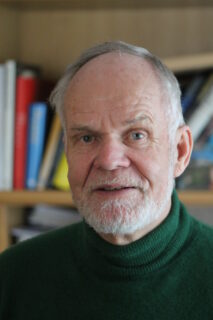Obituary for Prof. Dr. Christian Toepffer
Christian Toepffer was born on May 21, 1941, in Breslau, studied physics from 1960 to 1963 at the University of Hamburg, then in Freiburg, where he received his diploma in 1966. He went to the Institute for Theoretical Physics at the University of Frankfurt to pursue his doctorate. There he worked on the theory of inelastic electron scattering and received his doctorate in 1967. During his subsequent “years of teaching and traveling,” he worked at many research institutions and repeatedly explored new topics. Until 1974, his base remained at the Institute for Theoretical Physics at the University of Frankfurt. In 1967/68, he was a research associate at the Institute for Advanced Studies at the University of Virginia in Charlottesville, USA, and in 1970/1971, he took the then unusual and courageous step of moving to the Nuclear Research Center in Dubna, USSR. During this time, the theory of heavy ion reactions became his main topic. This led to his habilitation at the University of Frankfurt in 1972 and he became an associate professor at the Institute for Theoretical Physics at the University of Frankfurt in 1972. In 1973/74, he went to the University of Witwatersrand in Johannesburg, South Africa, as a visiting professor, where he took up electron diffraction in crystals as a further research topic. The visiting professorship became a regular professorship in Johannesburg. In between, he took up a visiting professorship at the Technical University of Darmstadt in 1976/77, where his expertise in the theory of electron scattering was in demand. There he also became acquainted with the challenging questions of accelerator physics, which were to play a major role later on. In 1978/79, he was a visiting researcher at Oak Ridge National Laboratory in Oak Ridge, USA. In 1980, he was appointed full professor at the Institute for Theoretical Physics at Friedrich-Alexander University Erlangen-Nuremberg, where he taught and conducted research until his retirement in 2006. Here, his research focused on transport theory in many-particle systems, chaos theory, electron cooling in accelerators, and, related to this, two-component plasmas in strong magnetic fields. He also maintained close contacts with renowned institutes, such as the Society for Heavy Ion Research (GSI) in Darmstadt and, immediately after German reunification, the Institute of Plasma Physics at the University of Rostock.
So much for his scientific career. A very important focus of his work in Erlangen was teaching. He worked hard to build bridges for first-year students to help them overcome the theoretical physics that most students find difficult, while at the same time always demanding high academic standards. He showed the same great commitment to teaching in his dealings with the diploma and doctoral students at his institute. As a rule, he met with each student in his working group at least once a week. He set high standards for his group, but always in a way that served as motivation. Beyond his chair, he was also actively involved in university committees. He was deeply committed to maintaining high academic standards in research and teaching, which he saw as threatened by the spirit of the times.
In closing, a personal note: Christian Toepffer was a good friend and highly esteemed colleague. We worked closely together on many projects, especially in supervising graduate and doctoral students. With his keen sense of developments and his unfailingly accurate judgment, he was an irreplaceable advisor to me in many areas: research, teaching, and university policy. Through his prudent leadership of the institute, he gave me a great deal of freedom for research. I am very grateful to him for that.
by Prof. Paul-Gerhard Reinhard
